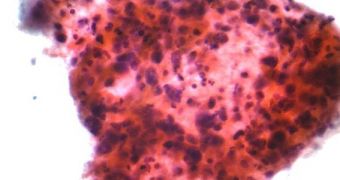A group of investigators with the School of Medicine at the Stanford University, led by scientist Dr. Maximilian Diehn, is currently working on developing an extremely sensitive test that could be used to detect the DNA signature of cancer in the human body. The approach could soon be used to detect cancers earlier on than possible with existing methods.
What oncologists are really interested in are techniques for both diagnosing and tracking all types of cancers. When the disease evolves sufficiently, dangerous cells can flake off tumors and use the bloodstream to infect organs throughout the body. These cells can grab ahold of lungs, hearts, kidneys, and so on, causing metastases and death. Detecting them as early on as possible is critical.
At this point, keeping tabs on the development of cancer via basic blood tests is impossible, but we are getting increasingly closer to this objective. In the new investigation, scientists have used a blood test to identify people with lung cancer, bringing the goal of using simple tests for complex cancer monitoring purposes closer to reality.
Diehn, an expert radiation oncologist and a DNA researcher, is currently working on ways to detect the minute amounts of DNA available in the cells that flake off cancer tumors. “The problem has been that there's a very small amount of the DNA there, usually, so it's very hard to detect,” he explains, adding that modern technologies are slowly bringing this objective within reach.
What the Stanford team wants to accomplish is develop a way of scanning these small DNA fragments for signs of mutations that are indicative of tumors. Each type of cancer, the group explains, has a series of genetic signatures associated with it, so the new blood test could be used to identify and track the progression of every cancer type, at least in theory.
“The initial impetus was having something I could use in my own patients […] as a blood test that would let us both detect the presence of cancer as well as monitor how a patient's cancer responds to various treatments,” the team leader explains. Details of the new study appear in a recent issue of the top scientific journal Nature Medicine.
The new tests could also conceivably be used to determine whether or not traces of tumors remain in patients once surgeries have been completed. Scientists plan to create a DNA test that is extremely sensitive to even the most minute amounts of genetic material present in the bloodstream.
“If there is cancer DNA in the body left, that suggests there are still cancer cells left, so that patient is probably not cured, whereas if the cancer DNA is gone, that suggests the patient is likely to be cured,” Diehn concludes, quoted by NPR.

 14 DAY TRIAL //
14 DAY TRIAL //